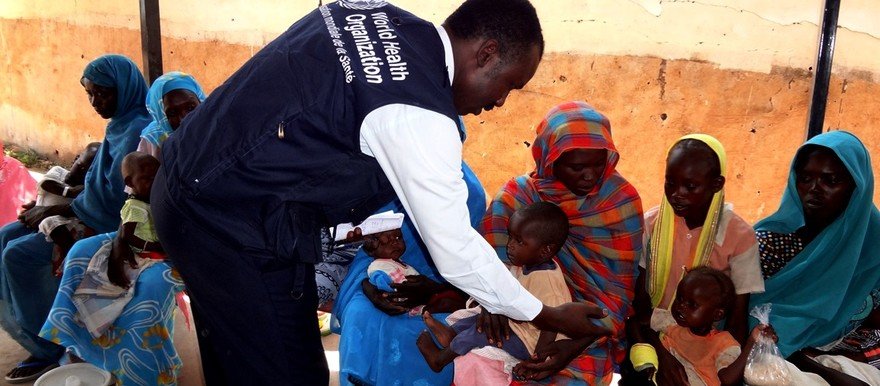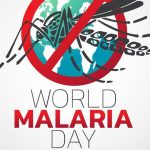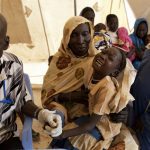The World Health Organization has warned that the number of deaths from malaria in sub-Saharan Africa could be double the annual rate this year owing to the coronavirus pandemic.
The WHO says border closures and travel restrictions imposed to halt the spread of Covid-19 could disrupt the supply of medicine and insecticide-treated nets that help prevent malaria.
This could in turn lead to a return to malaria mortality levels last seen 20 years ago.
African countries usually account for over 90% of the more than 400,000 deaths from malaria recorded each year.
But new analysis by the WHO indicates nearly 760,000 people in the region could die from the mosquito-borne disease.
The UN body is urging countries to increase the distribution of such supplies while they can.
The World Health Organization has warned that the number of deaths from malaria in sub-Saharan Africa could be double the annual rate this year owing to the coronavirus pandemic.
The WHO says border closures and travel restrictions imposed to halt the spread of Covid-19 could disrupt the supply of medicine and insecticide-treated nets that help prevent malaria.
This could in turn lead to a return to malaria mortality levels last seen 20 years ago.
African countries usually account for over 90% of the more than 400,000 deaths from malaria recorded each year.
But new analysis by the WHO indicates nearly 760,000 people in the region could die from the mosquito-borne disease.
The UN body is urging countries to increase the distribution of such supplies while they can.
The World Health Organization has warned that the number of deaths from malaria in sub-Saharan Africa could be double the annual rate this year owing to the coronavirus pandemic.
The WHO says border closures and travel restrictions imposed to halt the spread of Covid-19 could disrupt the supply of medicine and insecticide-treated nets that help prevent malaria.
This could in turn lead to a return to malaria mortality levels last seen 20 years ago.
African countries usually account for over 90% of the more than 400,000 deaths from malaria recorded each year.
But new analysis by the WHO indicates nearly 760,000 people in the region could die from the mosquito-borne disease.
The UN body is urging countries to increase the distribution of such supplies while they can.
The World Health Organization has warned that the number of deaths from malaria in sub-Saharan Africa could be double the annual rate this year owing to the coronavirus pandemic.
The WHO says border closures and travel restrictions imposed to halt the spread of Covid-19 could disrupt the supply of medicine and insecticide-treated nets that help prevent malaria.
This could in turn lead to a return to malaria mortality levels last seen 20 years ago.
African countries usually account for over 90% of the more than 400,000 deaths from malaria recorded each year.
But new analysis by the WHO indicates nearly 760,000 people in the region could die from the mosquito-borne disease.
The UN body is urging countries to increase the distribution of such supplies while they can.
The World Health Organization has warned that the number of deaths from malaria in sub-Saharan Africa could be double the annual rate this year owing to the coronavirus pandemic.
The WHO says border closures and travel restrictions imposed to halt the spread of Covid-19 could disrupt the supply of medicine and insecticide-treated nets that help prevent malaria.
This could in turn lead to a return to malaria mortality levels last seen 20 years ago.
African countries usually account for over 90% of the more than 400,000 deaths from malaria recorded each year.
But new analysis by the WHO indicates nearly 760,000 people in the region could die from the mosquito-borne disease.
The UN body is urging countries to increase the distribution of such supplies while they can.
The World Health Organization has warned that the number of deaths from malaria in sub-Saharan Africa could be double the annual rate this year owing to the coronavirus pandemic.
The WHO says border closures and travel restrictions imposed to halt the spread of Covid-19 could disrupt the supply of medicine and insecticide-treated nets that help prevent malaria.
This could in turn lead to a return to malaria mortality levels last seen 20 years ago.
African countries usually account for over 90% of the more than 400,000 deaths from malaria recorded each year.
But new analysis by the WHO indicates nearly 760,000 people in the region could die from the mosquito-borne disease.
The UN body is urging countries to increase the distribution of such supplies while they can.
The World Health Organization has warned that the number of deaths from malaria in sub-Saharan Africa could be double the annual rate this year owing to the coronavirus pandemic.
The WHO says border closures and travel restrictions imposed to halt the spread of Covid-19 could disrupt the supply of medicine and insecticide-treated nets that help prevent malaria.
This could in turn lead to a return to malaria mortality levels last seen 20 years ago.
African countries usually account for over 90% of the more than 400,000 deaths from malaria recorded each year.
But new analysis by the WHO indicates nearly 760,000 people in the region could die from the mosquito-borne disease.
The UN body is urging countries to increase the distribution of such supplies while they can.
The World Health Organization has warned that the number of deaths from malaria in sub-Saharan Africa could be double the annual rate this year owing to the coronavirus pandemic.
The WHO says border closures and travel restrictions imposed to halt the spread of Covid-19 could disrupt the supply of medicine and insecticide-treated nets that help prevent malaria.
This could in turn lead to a return to malaria mortality levels last seen 20 years ago.
African countries usually account for over 90% of the more than 400,000 deaths from malaria recorded each year.
But new analysis by the WHO indicates nearly 760,000 people in the region could die from the mosquito-borne disease.
The UN body is urging countries to increase the distribution of such supplies while they can.














